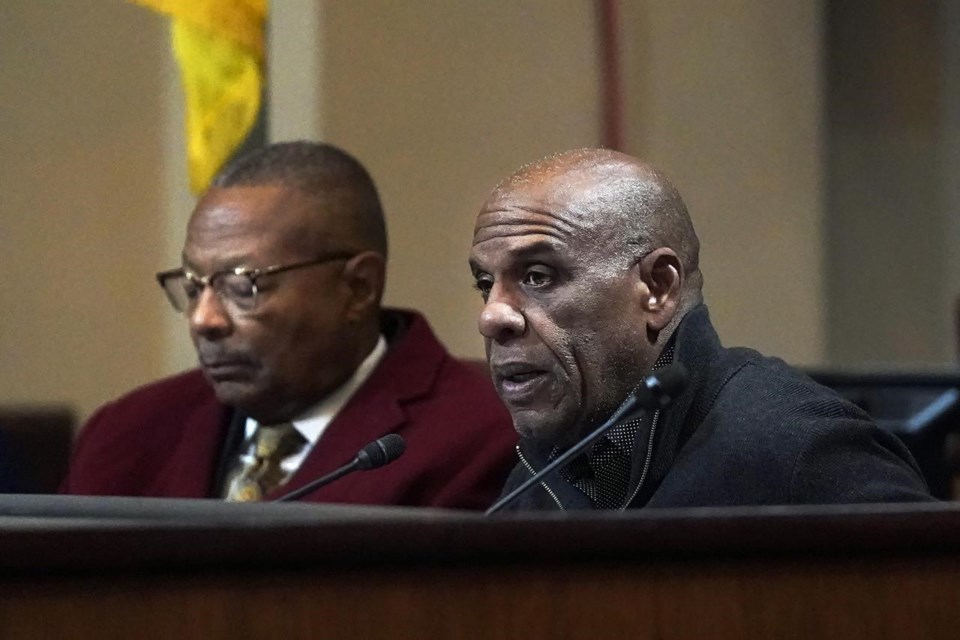SACRAMENTO, Calif. (AP) — As California lawmakers hail the work of a historic panel that has delved into reparations proposals for African Americans for nearly two years, a state senator on the task force is warning Black residents to not assume that large cash payments are on the way.
Democratic Sen. Steven Bradford, of Los Angeles, said “anything's possible if the money's there,” but he remains “realistic” that it could be difficult to garner enough support for large payments at a time when lawmakers haven't even debated where the money would come from.
“I don’t want to set folks' expectations and hopes up that they’re going to be getting, you know, seven-figure checks,” Bradford said in an interview. “That’s just not happening.”
The task force on Saturday approved proposals in its final report, which is officially due to lawmakers by July 1. They included estimates from economists who say the state is responsible for more than $500 billion due to decades of over-policing, mass incarceration and redlining that kept Black families from receiving loans and living in certain neighborhoods.
The panel stopped short of endorsing specific payment amounts but recommended "any reparations program include the payment of cash or its equivalent” to eligible residents. It doesn't delve into how the state would pay for reparations programs.
Marcus Champion, a Los Angeles resident and organizer with the Coalition for a Just and Equitable California, a reparations advocacy group, criticized Bradford's comments.
“That is not the way you come to the table to pay a historic debt,” he said. “That is not the way that you come to the table in any type of negotiation. Start as high as you possibly can, and then work from there.”
Payments are part of a long list of recommendations from the nine-member task force that has studied how the state could apologize and offer recompense for policies that drove housing discrimination, mass incarceration and health disparities long after chattel slavery was abolished. The proposals come as the state faces a projected $22.5 billion budget deficit.
Democratic Gov. Gavin Newsom said in a statement that “dealing with the legacy of slavery is about much more than cash payments.”
“The Reparations Task Force’s independent findings and recommendations are a milestone in our bipartisan effort to advance justice and promote healing,” Newsom said. “We need to wait for the Task Force to finish its work and submit its final report.”
Assemblymember Reggie Jones-Sawyer, another Los Angeles-area Democrat on the task force, took a more cautious approach in predicting the fate of payments or other reparations proposals. He said in an interview that it's too early to know whether payments could get passed in the Legislature, as the committee's report deadline looms.
“We have absolutely no idea right now what will or will not be approved,” he said.
The task force’s proposals are wide-ranging and ambitious. They include the creation of an agency that would help residents research their family’s history, promote financial literacy and preserve historic, cultural sites.
The panel has also endorsed policies to increase tree canopy in historically redlined areas, to provide more incarcerated people with job training that prepares them for life after their sentences and to restore land seized unfairly from Black families through eminent domain.
The committee is calling on the state to issue a formal, public apology for its legacy of slavery and discriminatory policies. Although California entered the union as a “free” state, it did not enact laws guaranteeing African Americans’ freedom, the draft report said. The apology could include a condemnation of Peter Hardeman Burnett, California’s first elected governor and a white supremacist who personally enslaved people and pushed for Black people’s exclusion from the state.
Assemblymember Lori Wilson, who chairs the state Legislative Black Caucus, said in a statement that the caucus will champion policy proposals included in the task force's report.
“We look forward to working collaboratively with our Legislative colleagues and Governor Newsom’s Administration as we continue to fight for equity in our communities,” the San Francisco Bay Area Democrat wrote.
Newsom signed a law in 2020 creating the task force. The goal of the legislation — authored by Secretary of State Shirley Weber, a former state assemblymember — was for the panel to study remedies for Black Californians, “with a special consideration for” the descendants of people who were enslaved.
Last year, the task force voted that compensation be limited to descendants of Black people living in the United States before the end of 19th century. The panel more recently endorsed further limiting eligibility to residents living in California for at least six months while certain discriminatory policies and practices were in effect, with possible exceptions.
Weber's bill stated a reparations program in California should not be considered a “replacement” for a program at the federal level. That issue has stalled in Congress with a bill to create a commission studying reparations proposals that has not been voted on since it was first introduced in the 1980s.
No other state in the country has gotten further along than California in its consideration of reparations proposals for Black Americans. Task Force Chair Kamilah Moore said she's hopeful recommendations including the agency and payments could get enough support from state lawmakers.
“We've gone above and beyond,” Moore said of the group's work.
___
Sophie Austin is a corps member for the Associated Press/Report for America Statehouse News Initiative. Report for America is a nonprofit national service program that places journalists in local newsrooms to report on undercovered issues. Follow Austin on Twitter: @sophieadanna
Sophie Austin, The Associated Press



